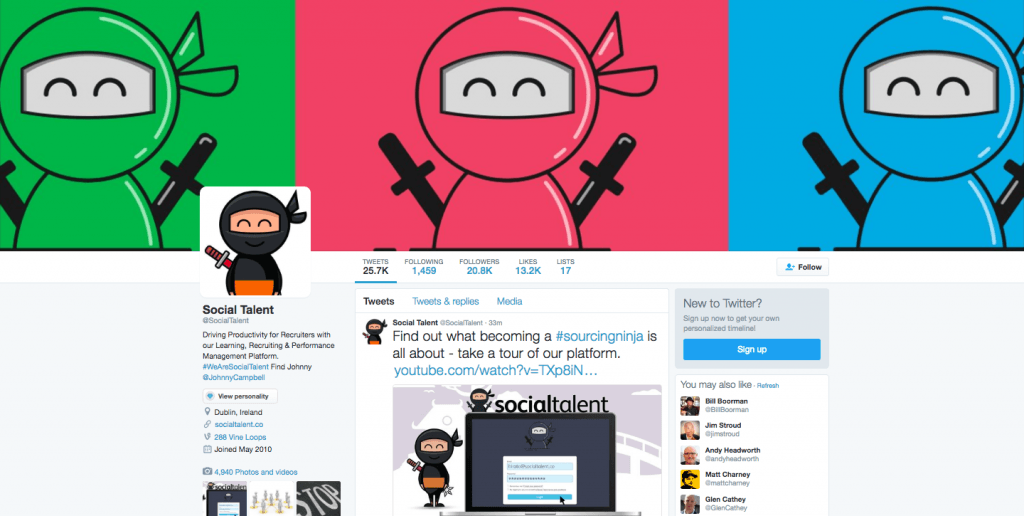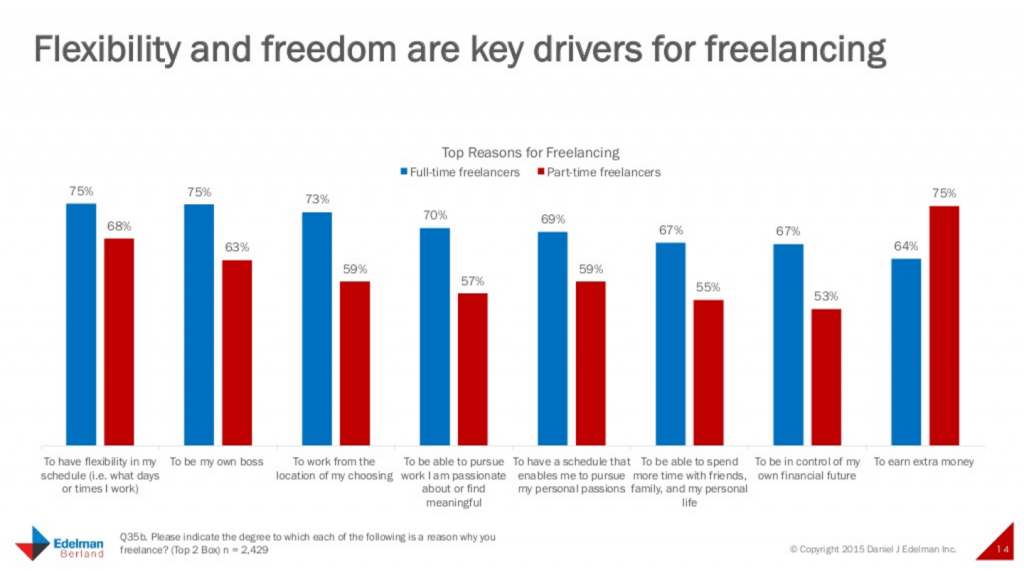The ‘online gig economy’ is such a buzzword these days – but what exactly does it mean? In a nutshell, the online gig economy is basically about workers for various platforms who utilize new technologies and markets for alternative work arrangements. So we’re talking about the likes of Uber and Lyft drivers, AirBnB hosts, Hassle.com cleaners, and so on. Now you may be thinking ‘What does this have to do with recruiting?’ Well, the answer is a lot!
Over 53 million Americans are now doing freelance work, according to a survey carried out by the Freelancers Union and Upwork. What’s most interesting is that 60% of these people have made the decision to work freelance by choice, and not out of necessity. This particular statistic should give recruiters a lot of food for thought. Is the ‘Uberization’ of recruitment on the horizon? Will hiring staff eventually become an exercise whereby you open up an app and ‘order’ a permanent staff member for your organization? Today, we’re breaking down everything you need to know – from where recruitment currently stands on the topic, to the benefits and challenges of the gig economy for recruiters.
 Where Recruitment Stands
Where Recruitment Stands
We’re already seeing the impact of the gig economy on temp volume staffing, but this will expand over the next couple of years – there’s no doubt about it. In fact, Johnny Campbell himself predicted that ‘Uberization’ is on the cards for the recruitment industry in the webinar ‘3 Trends Shaping the Future of Recruitment’. We’re already seeing this with the likes of Upwork, where you can ‘find freelancers to tackle any job, any size, any time’. App-based automation has disintermediated a number of industries and we think you’ll see more and more of this in temporary staff recruiting. Think about it like this – If you need a receptionist to work for a day and you trust that as long as the person shows up on time and doesn’t steal anything, it’s fine – there’s no need to go through the process of CV screening, interviewing etc. The likes of an app work for this because there’s a level of trust there. In actual fact, this has been happening for years, except instead of using the technology you would need to go to the Golden Pages, ring around to see who’s available to work, make sure that they’ll show up to work on the day that they’re scheduled and so on and so forth. Now, it’s much easier – a lot of the admin and cost has been taken out of the equation.
Will we ever see companies hiring a full-time employee this way? Perhaps not just yet, but certainly sometime in the future. Right now, we’re all still quite reserved when it comes to purchasing ‘big ticket’ items online. If consumers aren’t ready to spend money on the likes of a car online, the same approach goes for hiring full-time staff. That level of trust in the system hasn’t yet been established; companies still want to hang onto control of screening CVs, interviewing candidates and getting that personal experience of meeting face to face. Short-term positions are already good to go, however, – smaller companies are currently building the apps to support this, and as soon as they have supply and demand sorted, they’ll be going to market to find candidates.
How Candidates Feel
Results from the Freelancers Union and Upwork survey showed that the top reasons for freelancing are:
- Having a flexible schedule (75%)
- Freedom of being their own boss (to an extent) (75%)
- Having the freedom to work remotely (73%)
- Being able to work in an area they are passionate about (70%)
- Being able to spend more time with friends and family (67%)
- Earning extra money (64%)
This doesn’t come as much of a surprise considering that 60% of freelancers have decided to make the switch from full-time work of their own accord. What’s interesting is that earning extra money isn’t one of the main driving forces, it’s flexible schedules and being their own boss. If you’re a recruiter that deals with sourcing contractors, it’s important to take note of this.
If you’re trying to find contractors to work on a project in-house from 9am – 5pm, Monday to Friday, don’t be surprised if you find it hard to get these people. Not only are they not really contractors if they are working full-time in an organization, but chances are that they moved to freelancing because they want a certain level of control over how they work and when they work. As a result, you need to be flexible (especially with the likes of remote working) if you want to attract top talent.
The Challenges
 As interesting as the rise and rise of contract workers is, it’s also managed to open up a major can of worms for organizations; companies that utilize a contingent workforce can no longer shift responsibilities to staffing companies without consequence. According to Nicole Greenberg, Principal Consultant & Chief Legal Advisor at STA Worldwide, new US laws actually mandate that the company for whom work is performed must ensure compliance for contingent workers as if they were direct companies.
As interesting as the rise and rise of contract workers is, it’s also managed to open up a major can of worms for organizations; companies that utilize a contingent workforce can no longer shift responsibilities to staffing companies without consequence. According to Nicole Greenberg, Principal Consultant & Chief Legal Advisor at STA Worldwide, new US laws actually mandate that the company for whom work is performed must ensure compliance for contingent workers as if they were direct companies.
Taxes
When it comes to tax-filing, independent contractors have been causing major headaches by not filing their taxes correctly at the end of the year. When this happens, companies start to get letters from the IRS (or equivalent national revenue agency) saying that these contractors didn’t pay the right taxes and start looking for information about the type of work that they did, how long they worked in the organisation, how they were classified, etc. This happened a great deal during the recession with IT professionals, in particular.
Misclassifications
This is a big one. When you bring a contractor into your organisation, it’s vital to remember that they are working WITH you, not FOR you. You can’t have them working side-by-side with an employee that does the exact same job but on a full-time basis. You need to fully understand the classification of this person, because everybody is an employee of someone. Unless you’re subcontracting an employee from a staffing agency for a project, or unless that person is a bonafide self-employed worker, then you can nearly assume that they are an employee of your company.
Benefits
One of the main concerns of freelance workers is the lack of benefits available to them such as health care and retirement funds. Unfortunately, organisations can’t provide too much help to independent contractors due to the legalities involved. They can try to assist in other ways, for instance referring the contractor to an insurance company that they have connections to. But ultimately, when you’re dealing with independent contractors, there really is very little that you can do to alleviate these concerns.
How Recruiters Should Approach ‘Uberization’
 Even if you aren’t a contract recruiter, you should still be educating yourself on the topic. Can we really say that the typical 9-5 job will be the norm forever? It’s inevitable that non-traditional working arrangements will continue to rise, so even if you don’t recruit these types of workers now, it’s fair to say that this can and will change in the not-so-distant future. With advancements in technology, there will be an almost-certain shift from the low-skilled gig economy to one that is full of highly-skilled professionals.
Even if you aren’t a contract recruiter, you should still be educating yourself on the topic. Can we really say that the typical 9-5 job will be the norm forever? It’s inevitable that non-traditional working arrangements will continue to rise, so even if you don’t recruit these types of workers now, it’s fair to say that this can and will change in the not-so-distant future. With advancements in technology, there will be an almost-certain shift from the low-skilled gig economy to one that is full of highly-skilled professionals.
If you are, on the other hand already recruiting for these types of roles, specifically ones that require in-demand skills, keep in mind the motivators for freelancer workers. Remember that they are working with you and not for you. Remember that they have most likely chosen to work freelance. In order to make a role attractive to freelancers, you’re going to need to offer a high level of flexibility. Expecting an IT professional to set up camp in your company to complete a project from Monday to Friday, 9am -5pm for 6 months probably is probably unrealistic. Giving that contractor the freedom to deliver a particular project by a particular date with whatever support they need, however…now you’re in business.
What are your predictions for the future of recruitment? Do you think we’ll eventually hire full-time staff through an app? We want to hear your thoughts. Tweet us and let us know what you think now!

This post first appeared on the Social Talent Blog.

